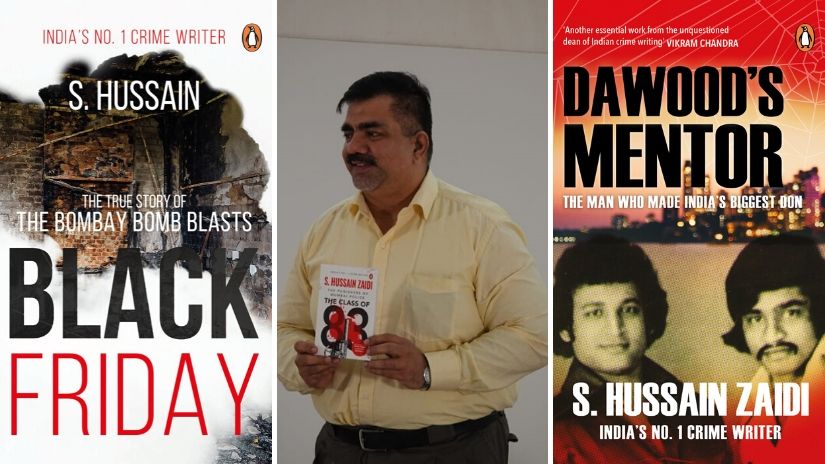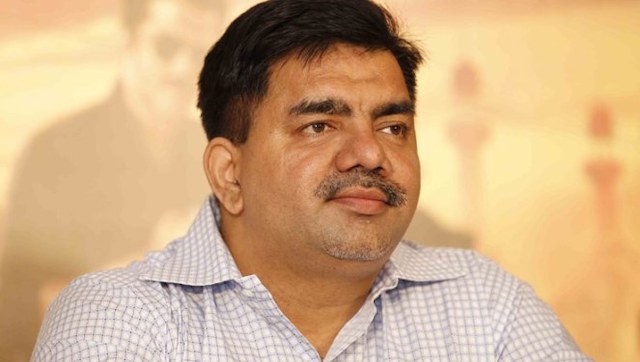Hussain Zaidi was 27 and jobless when he joined The Indian Express in Mumbai. He did not have specific ambitions other than to provide for his family. A rookie reporter then, Zaidi, didn’t think too much of it when his editor asked him to take up the crime beat. “I just wanted to score a front page byline. I had no idea about the kind of life and experiences that awaited me back then," he says.
Two years later, Zaidi interviewed, exclusively, and for the last time, the most wanted man in India – Dawood Ibrahim. He would soon become one of the most prolific reporters on the beat, documenting and investigating Mumbai’s underworld at a pace, and with a depth that not many were able to match. Over the past two decades, he has also become the source of gritty crime stories, furiously adapted for both cinema and streaming.
Class of 83, which recently released on Netflix, is based on Hussain Zaidi’s book, his first on the Mumbai Police.
[caption id=“attachment_8606751” align=“alignnone” width=“640”]  Bobby Deol in a still from Class of ‘83. Netflix[/caption]
Zaidi is a straight speaker, an out and out journalist, probably more adept as asking questions than providing philosophical answers to them. As to whether a life of stalking and chasing the knife’s edge has rubbed off on him in any way, he says plainly, “My father used to say there is innate goodness and evil in every human being. I’m capable of doing wrong, just as much as you are. It is only about whether we let this side become us, and who we are. If you have conviction, and values, nothing can change your beliefs.” Zaidi is a teetotaller and claims to have never uttered an abusive word during the course of his 25 years in reporting on the vilest breed of foul-speaking humans there is – the mafia. “I was told that unless you start abusing or drinking alcohol, you will never become a successful journalist. I did not conform with that perception, yet I feel that by the grace of almighty I am quite successful. Despite speaking chaste Urdu and Hindi, never had a sip of alcohol and have still gotten stories that went on the front page," he adds.
Tailing criminals and crime, in general, comes at psychological cost. Zaidi witnessed his first encounter in 1997, while tailing a local cop. “It was a traumatic experience, that first time. It took me months to get over,” he reminisces. A couple of years later, he narrowly escaped death when the police nabbed a sharpshooter before he ticked Zaidi’s name off from his list. “I believe that it’s only God who decides when one will die. It’s not up to people like you and me. I have travelled to foreign countries, in search of international criminals. I scoured for Dawood in Karachi, and not a thing happened. I believe it is destiny. I have to believe in it, or else I would be too scared to do my job,” he says. Not everyone though has that elusive narrative written in their favour. In 2011, Zaidi’s protégé, Jyotirmoy Dey, was shot in broad daylight by armed assailants on a motorbike.
Zaidi wrote his first book, Black Friday, about the Mumbai bomb blasts in 2002. It was soon after turned into a film by Anurag Kashyap.
[caption id=“attachment_7669611” align=“alignnone” width=“640”]  Hussain Zaidi (centre) at the launch of his latest book, The Class of 83. Black Friday and Dawood’s Mentor are among some of his most popular books on Mumbai’s underworld scene.[/caption]
“I could never have imagined that my first book would be turned into a film. Black Friday opened so many doors for me. To me that was just a stroke of luck. I have never really worked on anything with the intention of having it adapted to screen and film,” he says. Over the last two decades, Zaidi has written a several books documenting the lives of Dawood Ibrahim, Abu Salem, Haji Mastan, Karim Lala and so on. It’s incredible, really, that one man has accessed minds that in general parlance can only be deemed notorious and evil, and yet not philosophised either existence or purpose. He has, he believes, neither made any friends in his life, nor enemies. Even though the latter though is hard to accept. “It’s simple. I’ve written as strongly against police brutality and corruption within the department as I have against the likes of Salem and Ibrahim. You are doing your job right if you are not taking any sides,” he says.
The demand for Zaidi’s work can be adjudged by the fact that Class of 83 was acquired by Red Chillies even before he had completed it. “I had written books about the dons and underworld of Mumbai, but I hadn’t written a book about the police. This narrative, this story from the 80s intrigued me and I wanted to bring it to a wider audience,” he says.
For all its stylistic flourishes, the Netflix film joins a long line of Bollywood projects that glorifies trigger-happy cops. “I do not endorse police encounters. I do not believe in them as a mode of justice. I have in fact exposed several fake encounters over the course of my two decade long career. The police has to choose a certain method because criminals escape the system too easily, and return to a life of crime at the end of it. Because they can’t get these criminals sentenced or punished the police chooses to fight bullets with bullets,” he says. In an interview with NYT, several years ago, Zaidi claimed 95 percent of all encounters were fake.
The popularity of Zaidi’s work, which he claims is enough to sustain him on its own now, is reflected in the boom of the Mumbai noir genre. “We have always been interested in villains. Right from Mother India to Baazigar, something about the negative character is fascinating. But for a long time this portrayal was too gimmicky, like that of Ajit [from Yaadon Ki Baarat, who addresses his secretary in a nasal twang as ‘Mona darling’]. It’s after stories, interviews and books began being written about actual criminals, that we got a better understanding of their mind,” he says.
What about the many masculine eccentricities or exaggerations that fiction writers liberally layer their characters with? “DK Rao, the gangster thrice survived police encounters. On the third occasion, he was shot 16 times. They waited for him to die and he, somehow still stood up at the hospital. This is fact, this has happened. It’s hard to believe, but it’s in the police records. What is true is true ,” he adds. Rao’s brother, only last year, fought civic elections from Dharavi.
Zaidi’s life, it is safe to say, isn’t as simple as other writers who conjure their villains behind locked doors. He has, instead, stared into their eyes. Given his success, he also sits on the boundaries between media, crime and Bollywood.
One need not look too far to find absurdity or be swallowed by its ubiquity. “I think these criminals choose to speak to me because I never convey the idea that I belong to the other side or that I’m trying to push a perspective. It’s not that because I’m a Muslim, that Muslim gangsters might see me as allies. I have grown up in a secular home, I don’t think that way. Even with criminals, there has to be that dignity that you need to uphold,” Zaidi says about just why bad people would want to talk to him. This explains Zaidi’s matter-of-fact tone, his temperament and aversion to intellectualising the criminal mind. He calls himself a ‘pen pusher’ and considers himself lucky to have worked in journalism, back when it meant something.
Would he ever consider writing his own story, a small memoir maybe? “I’m not that important. All I want to do is my journalism and die doing stories I love,” he says, chuckling, for the first time.


)
)
)
)
)
)
)
)
)



